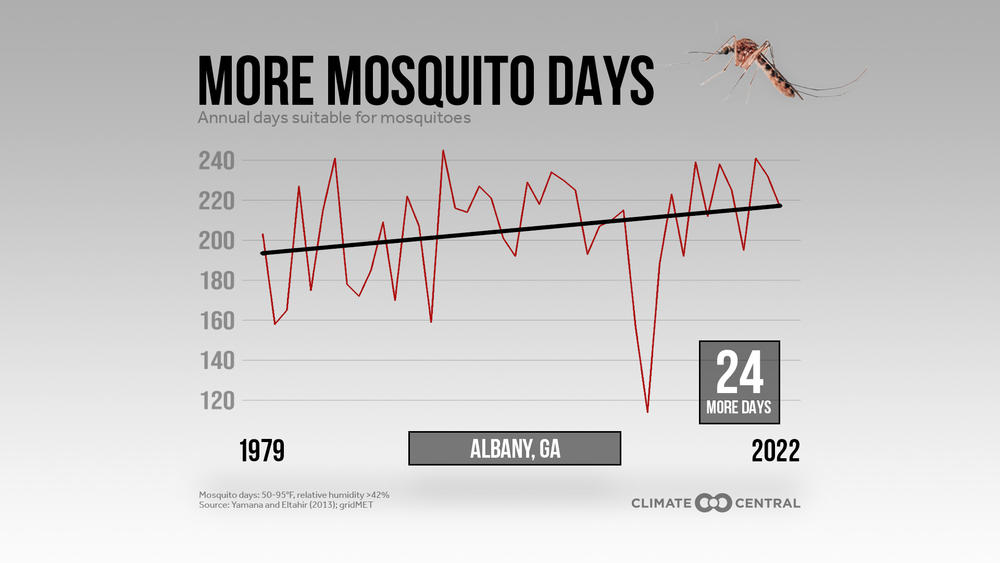
Section Branding
Header Content
Experts say more mosquito days are ahead this summer. What does that mean for Georgia?
Primary Content
LISTEN: UGA public health extension specialist Elmer Gray explains to GPB's Ambria Burton how scientists and professionals in the mosquito control industry educate people on where they grow and tips to eliminate them in areas around them.
_______
Georgia's mosquito season generally starts in March or April and ends around October when temperatures drop. This year's mosquito season could be more populated as a recent Climate Central report shows an expected annual increase of mosquito days in about 173 locations in the U.S., based on their assessment of trends from 1979 to 2022 in 242 locations.
According to the report, the increase in mosquito days is because they can "thrive in warm and humid conditions that are becoming more frequent" in those 173 locations.
Elmer Gray is a public health extension specialist and research professional at the University of Georgia's College of Agricultural and Environmental Sciences. His research mainly focuses on mosquitoes and other insects such as black flies. In addition, he also serves on the Board of Directors for the Georgia Mosquito Control Association as a part of his public health extension work.
He says the reason why mosquitos increase in heat comes down to warmer temperatures allowing them to grow.
"Their growth is related to the temperature and the amount of food available to them, so the higher the temperature, the faster an insect grows," Gray said to GPB. "The warm temperatures just physiologically allow them to grow faster, and they're cold-blooded organisms, so when it gets warm, they get active."
As Climate Central's report says, the South and southeastern regions of the United States typically witness the most annual mosquito days, over 50% of the year. Gray explains that the South has more mosquitos on average because it has "a longer growing season."
"Mosquitos in the South are more adapted to the warmer temperatures, so when it's cold, they are very slow," he said. "The ideal temperature for mosquitos is the upper 80s — mid to upper 80s."
Other factors separate from temperature affect mosquito activity, such as weather conditions including rainfall, humidity and droughts. The more rain there is, the more standing water, which allows female mosquitos to lay their eggs, according to Gray.
"The female mosquito will deposit her eggs on the surface of the water or in areas that will later become flooded," he said. "The eggs need water at some point to hatch, and the larval and pupal stages both have to have standing water. More rainfall typically means more mosquitoes."
Humidity due to warmer weather also benefits insects like mosquitos by allowing them to be more active.

The Climate Central report shows that there will be an average of 16 more mosquito days within the locations said to have a mosquito day increase this year. Several cities in Georgia are some of the areas that will have additional mosquito days this year, with Albany having the most at 24 additional days. Others are:
- Atlanta: 15 additional days
- Columbus: Eight additional days
- Augusta: Five additional days
- Savannah: Four additional days
Gray says that today's mosquito control industry comprises a "scientific group of professionals that try to use an integrated approach where we try to educate people about where misquotes grow." He gives the following tips to people that could reduce mosquitos around their homes:
- Dump out standing water
- Get rid of the tires in your yard
- Work with your community to help keep storm drains clear
"Anything you do to keep the water moving and drained off will help eliminate mosquitos," he said.
Scientists and professionals have to know what specific mosquito species is bothering people because it tells them where to look for problems they are not seeing.
"If you live in Atlanta along the Chattahoochee and you got a bunch of mosquitoes in your yard, are they coming from the flood, paddling along the river?" Gray said. "Are they some wild mosquito or floodwater mosquito? Are they coming from the containers on your neighbor's porch? We need to know the species and where to look for them."
He adds, "If we can't get rid of the water, we use Environmental Protection Agency-approved larvicides, and various active ingredients exist. There are bacteria-based products, oil, and mineral oil forms to control mosquitos effectively."
As for how Georgians can avoid being bitten by mosquitos during their peak season, Gray recommends doing "everything you can to eliminate standing water around your property." He also recommends:
- Wear light-colored, loose-fitting clothes
- Use an EPA-approved repellent
- Get good coverage of repellent for your body
- For children, apply repellant on adult hands to avoid them using their hands
- Use a box fan on your deck
- Use a repellent candle
Gray advises people to take mosquitoes seriously.
"Mosquito-borne diseases are real," Gray said. "There are viruses — the West Nile virus — transmitted by mosquitos. It's rare for people to get sick from it, but if they do, it will often cause encephalitis, which is inflammation of the brain's lining. It can be serious for the unlucky few that get it. The EPA-approved repellents are very safe. Most are approved for children as young as two months and are very effective."


